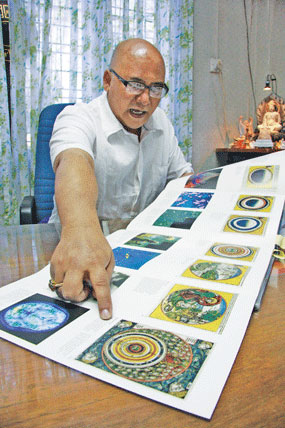Burma’s Press Scrutiny and Registration Division (PSRD) has censored an interview with a popular astrologer who predicted there would be no freedom of the press this year.
 The Express Times had prepared an interview with astrologer San Zarni Bo about the future of Burmese politics and freedom of the press, the journal’s editor, Kyaw Zay Yar Tun, told Mizzima.
The Express Times had prepared an interview with astrologer San Zarni Bo about the future of Burmese politics and freedom of the press, the journal’s editor, Kyaw Zay Yar Tun, told Mizzima.
The Express Times planned to publish the interview in its latest issue released on Monday, but the censors nixed the article. In the interview, San Zarni Bo said, “I do not see any sign of freedom of press… . I see the possibility that private daily newspaper could be launched in June.” Burma exercises prior censorship of all news publications. Currently, there are no private daily newspapers in Burma.
Editor Kyaw Zay Yar Tun said he believed San Zarni Bo’s interview was not allowed because it contained the predictions about freedom of press.
“[The prediction said that] there will be political changes, but freedom of press will not be granted. [He said] about three daily newspapers will be launched,” Kyaw Zay Yar Tun said.
San Zarni Bo told Mizzima, “According to astrology, freedom of press cannot be granted in Burma in the Burmese year 1374 [2012[. The phrase, [media is the] ‘fourth pillar’ [of the country], is just for show. First, they should manage well the first pillar, the second pillar and the third pillar. The fourth pillar is completely impossible. That is impossible, very impossible."
Kyaw Zay Yar Tun also said the astrologer’s comments about flaws in the current voter lists were not allowed. He said the journal had planned to quote an Aung San Suu Kyi statement: “Preventing [media] from telling the truth is restricting the freedom of media and it is like restricting the development of the country,” which she said during a press conference at her home on March 14, but the PSRD struck her remarks.
The incident underscores the on-again, off-again nature of freedom of the press in Burma, which has undergone small, rapid changes during the past year, accompanied by striking miscommunication or obfuscation on the side of the government.
A major international media conference was sponsored this week by the Burmese Information Ministry and the United Nations Educational, Scientific and Cultural Organization, which included local and international media representatives.
During the “Conference on Media Development in Myanmar,” Information Minister Kyaw Hsan said Burma’s media sector would have more transparency and freedom in the future.
He noted that President Thein Sein, in an address to Parliament in March 2011, said a new media law is being drafted, but not with the intention of banning or hampering press freedom. “Our aim is to facilitate the proper use of press freedom for the long-term progress of Myanmar’s media sector,” he said.
In contrast to their remarks, the Ministry of Mines last week sued the weekly news journal, The Voice, which published a story saying that some Burmese government ministries were cited for financial transgressions in a Union auditor-general's report.


